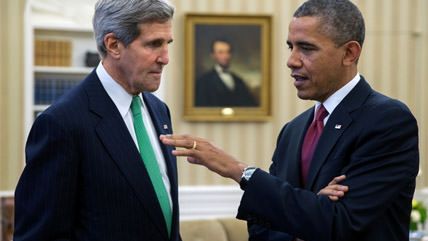Obama and Kerry Jeopardize Peace With Iran
Why does their rhetoric make us doubt their sincerity about seeking a diplomatic resolution?

Barack Obama and John Kerry should make up their minds: Do they want war or peace with Iran?
We should hope for peace, but Obama and Kerry make optimism difficult.
Ideally, the Obama administration would simply exit the Middle East, taking all its military and economic aid with it. The U.S. government cannot micromanage events there, especially when it is no honest, neutral broker. Shamefully, it is firmly in the Israeli camp against the Palestinians (who, let us remember, are the occupied, not the occupiers), and generally in the Sunni Muslim camp against the Shi'ites, led by Iran. (Iraq is the anomaly.)
As welcome as a U.S. exit would be, alas, it won't happen anytime soon, so the best we can hope for is rapprochement with Iran. The U.S.-led economic sanctions impose an unconscionable hardship on Iranians — for example, depriving the elderly and children of medicines and nourishment. Clearly, a war would be catastrophic on many levels for nearly all concerned, including Americans. (I say "nearly all" because opportunistic rulers in Israel and Saudi Arabia could benefit.)
Given the circumstances, one might expect signs of wholehearted American support for rapprochement, but we're not seeing them. The U.S. government, along with the four other permanent members of the UN Security Council and Germany, reached an interim agreement with Iran aimed at demonstrating the peaceful nature of the Islamic Republic's nuclear facilities. Of course, we already knew the intentions are peaceful. Iran is a party to the nuclear Non-Proliferation Treaty (NPT) and is routinely inspected by the International Atomic Energy Agency, which has certified that no uranium has been diverted to weapons production. Moreover, U.S. and Israeli intelligence say that Iran has not decided to build a nuclear bomb, and its Supreme Leader long ago condemned weapons of mass destruction as sinful.
Under the interim agreement, which is to be a bridge to a permanent accord, Iran will take additional measures to reassure the world, including converting its enriched uranium to a form unsuitable for weapons but appropriate for power generation and medical purposes.
This should cheer all peace-minded people. So why do Obama and Kerry say things that make us doubt their sincerity about seeking a diplomatic resolution?
For example, Kerry recently said that "the military option that is available to the United States is ready and prepared to do what it would have to do." Threatening war hardly demonstrates the spirit of peace-making.
Further, investigative reporter Gareth Porter points out that Kerry repeatedly says the agreement obligates Iran to "dismantle" nuclear equipment, such as centrifuges used to enrich uranium. Iranian President Hassan Rouhani protests that this is incorrect. Porter writes that the "tough U.S. rhetoric may be adding new obstacles to the search for a comprehensive nuclear agreement."
Is the administration moving the goal posts?
"In fact," Porter continues, drawing on CNN interviews, "[Iranian foreign minister Javad] Zarif has put on the table proposals for resolving the remaining enrichment issues that the Barack Obama administration has recognized as serious and realistic.… Zarif observed that the actual agreement said nothing about 'dismantling' any equipment.… So Iran was not required by the interim agreement to 'dismantle' anything." Instead, Iran agreed not to enrich over 5 percent, far below weapons grade, "and not increase enrichment capacity." Kerry's use of the word "dismantle" when discussing the future permanent agreement also disturbs Iran's leaders.
The NPT does not prohibit parties from enriching uranium for electricity and medical treatments.
"The Obama administration's rhetoric of 'dismantlement,' however, has created a new political reality: the US news media has accepted the idea that Iran must 'dismantle' at least some of its nuclear program to prove that it is not seeking nuclear weapons," Porter writes.
Thus, Kerry's deception could inflame the public against Iran and jeopardize the chance of a settlement.
Obama himself told the New Yorker's David Remnick there's less than an even chance of a permanent agreement, which is worse than the odds he gave late last year. And while he reminded Americans that it was the United States that overthrew a democratic Iranian government in 1953, he called on Israel and Saudi Arabia to focus on their common bond against Iran.
That doesn't sound like a man seeking peace.
This column originally appeared on the Future of Freedom Foundation.


Show Comments (59)